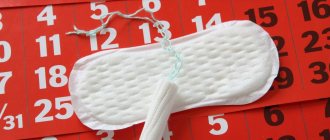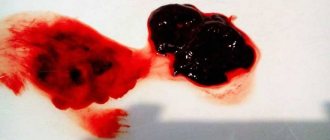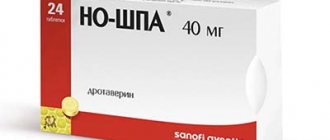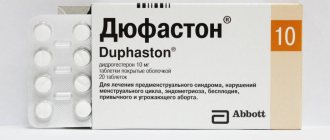How to overcome weakness during menstruation
Many women experience a lack of physical strength and energy during and on the eve of their critical days.
Weakness during menstruation can be so severe that it leads to disability and disruption of normal life activities. Sometimes the condition is combined with dizziness, nausea and even vomiting. The reasons for the appearance of weakness are different; without the help of specialists and a certain set of examinations, it is sometimes difficult to understand what is happening. How to understand your own health? And are there self-help options for such conditions? Read in this article
Reasons for appearance
Slight weakness and malaise may be normal for a healthy woman on the eve of and during menstruation. But the condition is not always associated with increased stress and psycho-emotional stress. This is especially true for the female body. Changes in hormonal levels can be so pronounced that it confuses the fair sex. But you shouldn’t attribute your condition to this alone. Often, weakness during menstruation may indicate serious illness.
Premenstrual syndrome
Its severity ranges from mild malaise to complete asthenia for several days. Weakness in this condition is part of a complex of symptoms. Along with it, lethargy, headache, nausea or even vomiting, pain in the mammary glands and lower abdomen, irritability, tearfulness, nervous excitability and others appear. Rarely does one woman experience everything at once.
Symptoms of premenstrual syndrome, including weakness, are largely dependent on lifestyle. Insufficient physical activity, poor or excessive nutrition, deficiency of vitamins and microelements in food (especially magnesium, C, A, E), nicotine and alcohol abuse lead to a more vivid clinical picture.
Depressive state
Changes in hormone levels throughout the cycle often lead to depression on the eve of and during menstruation. At the same time, sometimes a woman perceives this as weakness: she doesn’t want to do anything, she lacks emotional and physical strength. Gradually the condition passes, and by the middle of the cycle she feels well.
Decreased hemoglobin levels
Changes in blood counts are one of the serious reasons why a woman may feel tired and lack of strength. Many people do not even suspect that gynecological pathology sometimes leads to a decrease in hemoglobin levels in the blood. But it cannot be otherwise, because during menstruation a woman normally loses up to 150 ml of blood, and with pathology the figures vary greatly. Large monthly blood loss exhausts all the resources and reserves of the body, and it does not have time to recover. As a result, anemia occurs, sometimes severely, and this requires a blood transfusion.
The following conditions may be the causes of monthly large blood loss:
Malignant ovarian tumors do not lead to bleeding, but there is a sharp decrease in hemoglobin. And hence the general poor health.
In such situations, weakness will be combined with lethargy, increased fatigue, shortness of breath appears even during normal physical activity, the heart rate increases, blood pressure drops, the skin is pale, and there are some other signs.
Often, when the hemoglobin level decreases, a woman notices the appearance of a metallic taste in the mouth and a change in taste preferences.
Pregnancy
If weakness and nausea appear during menstruation, but the woman notes that the discharge is much less than usual, and it is even spotting, pregnancy cannot be ruled out. In this case, menstruation may come on time or with a slight delay. In fact, these are the threat of interruption, not critical days. Therefore, if a girl notices any other signs of pregnancy against the background of increased fatigue, she should do a test or determine the level of hCG in the blood, which is more informative.
Vegetative-vascular dystonia
Changes in pressure, often called VSD, are more susceptible to women of slight build, who are normally characterized by low blood pressure. On the eve of menstruation and especially during it, girls often notice weakness, which is associated with several reasons:
- loss of blood - fluid volume,
- fluctuations in hormonal levels with a predominance of the gestagenic component, which in itself reduces blood pressure.
Gradually the woman recovers, and the weakness disappears. It is possible to establish that such conditions are associated specifically with pressure drops by monitoring it throughout the entire cycle.
Other pathology
Often weakness can be present throughout a woman's life, but worsens during menstruation. Or the girl simply times it specifically for her critical days. Weakness and fatigue appear with many chronic diseases. As a rule, it occurs as a result of intoxication of the body with waste products of pathogenic microorganisms or its own cells. The most pronounced weakness is caused by tuberculosis, HIV, cancer of the blood and other organs.
Decreased hemoglobin levels
Changes in blood composition are a serious factor that can cause weakness and fatigue during menstruation. Not every girl is aware that monthly bleeding, as a result of which the body loses only 50-80 (in the worst case, up to 150) ml of blood, can cause a significant decrease in Hb levels, even leading to the development of severe anemia. This is especially true for women with weak immune systems and those whose periods are burdened by gynecological pathologies (for example, hyperplasia, fibroids, cancer of the uterus and its cervix, etc.).
Severe weakness followed by drowsiness, nausea, nausea with vomiting (leading to dehydration) and even loss of consciousness can result from significant monthly blood loss, exhausting all the body's reserves of strength. The main symptoms of low hemoglobin are: pale skin, shortness of breath, arrhythmia, metallic taste in the mouth.
If loss of strength during menstruation is accompanied by the conditions mentioned, this should be a reason to contact your family doctor and take a general blood test.
Self-help or how to deal with the condition
Before you begin to deal with such conditions, you should figure out why weakness constantly appears or intensifies during menstruation, and then goes away. If this interferes with a woman’s normal life, and even more so if she feels so bad these days that she cannot go to work, then you should definitely consult a doctor. Also, medical help should be sought if, along with general malaise, other symptoms are present, for example, pallor, shortness of breath, bleeding, etc.
If a woman is bothered by slight weakness and drowsiness during menstruation, she should slightly change her lifestyle, diet, and some habits, and a significant improvement will soon occur. Useful tips:
- Sometimes the prescription of contraceptive hormones reduces the degree of manifestation of premenstrual syndrome, respectively, and the loss of strength will not manifest itself in the same way on the eve of and during menstruation.
- Regular exercise and the use of relaxation techniques will help control the function of the cardiovascular system. If weakness is associated with pressure changes, then yoga, meditation, Pilates, even dancing can help you feel better.
- You should also spend enough time in the fresh air, because hypoxia (oxygen deficiency) can cause weakness, lethargy and increased fatigue.
- Performance largely depends on nutrition. The diet should contain sufficient amounts of fresh fruits and vegetables. If necessary, you can add courses of vitamins and microelements. A pattern has been identified between magnesium deficiency and fatigue, weakness, and irritability. Therefore, even doctors’ recommendations often include a course of taking medications of this microelement, for example, the drug “Magvit” and others. Also, on the eve of menstruation and during critical days, a woman has an increased need for vitamins B, C, A and E, and iron.
- It has been noted that coffee, nicotine and alcohol can aggravate well-being if weakness is a manifestation of premenstrual syndrome. Therefore, you should limit your consumption on these days. And even with a decrease in blood pressure, it is better to replace coffee with green tea, which, in addition to caffeine, contains a large amount of antioxidants.
- If the malaise is caused by a decrease in hemoglobin, then mandatory treatment will include long-term intake of iron. But the regimen is determined only by the attending physician.
How to feel better
In cases where your health worsens significantly during menstruation, you should seek help from a doctor. Only after identifying the causes of the illness, the gynecologist will tell you what to do and how to eliminate the unpleasant symptoms. Often, medications are used to help suppress pain and normalize hormonal levels. The course of therapy depends on the cause of weakness and the presence of accompanying symptoms.
There are a number of recommendations that you can follow to improve your condition:
- Systematic sports activities. Moderate physical activity helps normalize the activity of the cardiovascular system, which significantly affects well-being.
- Saturation of the body with oxygen. Regardless of the phase of your cycle and your state of health, you need to rest as much as possible in the fresh air. With hypoxia (oxygen deficiency), weakness, increased fatigue and lethargy are noted.
- Proper organization of the diet. The daily menu should include the maximum amount of fruits and vegetables . Harmful products should be excluded or minimized.
- Taking vitamins and microelements. Scientists have discovered a relationship between malaise and a lack of magnesium in the body. Therefore, women are often prescribed medications that contain this microelement. In addition, before and during menstruation, the body needs vitamins A, E, C and B.
- Quitting bad habits and drinking coffee. Premenstrual syndrome is more pronounced in women who smoke. Alcohol and coffee can also aggravate the condition. It is recommended to exclude these drinks during the period of regulation.
- Increased hemoglobin levels. If the problem arose due to the development of anemia, a long course of iron supplementation is prescribed.
Malaise during menstrual periods, at least occasionally, is observed in all women. It usually does not indicate health problems and is caused by natural causes. If the condition worsens significantly, and other clinical manifestations are observed in addition to general weakness, you should seek help from a doctor. Such symptoms may signal pathological changes in the body.
Women who experience weakness during menstruation, for the most part, consider this condition to be normal. But this opinion is wrong - malaise is often associated with PMS, a drop in hemoglobin levels, and other disorders. It is possible to get rid of painful health in the first days of the menstrual cycle. The first thing you need to do is schedule an examination , based on the results of which the doctor will prescribe treatment or advise methods of correcting the condition using non-drug means.
What happens during menstruation
During the entire cycle, the body prepares for possible motherhood; the hormone progesterone is intensively produced. If conception does not occur, its quantity decreases sharply, and prostaglandin hormones begin to be produced, which cause the onset of menstruation.
There is a narrowing of the vessels of the endometrium of the uterus, as a result of which its blood supply decreases. The mucous membrane begins to gradually exfoliate and separate from the uterus. Its remains are excreted together with the blood that accumulates due to ruptures of small vessels.
This process does not happen gradually. Some parts of the mucous membrane begin to disintegrate earlier, and some a little later. That is why critical days last from three to five days.
In parallel with the natural removal of exfoliated endometrium, a new layer of it grows. We can say that menstruation is a transitional moment from one cycle to the next.
Menstrual fluid consists of blood and secretions secreted by the glands of the uterus. In addition, it contains vaginal epithelial cells and mucous particles. A woman loses approximately 50 g to 80 g of blood during one menstruation.
On critical days, unpleasant sensations may often occur, such as:
- Pain in the lower abdomen. When visiting a doctor, girls often note that their ovaries hurt during menstruation. But in fact, pain in the lower abdomen is associated with contractions of the uterus during menstruation. Special medications will help eliminate pain.
- Unpleasant odor of menstrual discharge, causing discomfort to women.
- Nausea and fever.
Remember that hygiene is the key to women's health. You need to pay special attention to hygiene on critical days. You should take a shower at least twice a day, change pads every four hours, and wear comfortable underwear made from natural fabrics.
Nausea during menstruation
During menstruation, various hormonal changes occur in the body, as a result of which some unpleasant symptoms appear.
For example, nausea during menstruation. Typically, it occurs most often between menstruation and ovulation. Almost every girl has encountered symptoms of PMS, which, in addition to nausea, include chest pain, swelling, bloating, lower back pain and depression. All these unpleasant symptoms are caused by an imbalance of hormones such as estrogen and progesterone.
If you feel sick during your period, it may be due to increased levels of serotonin in the cerebrospinal fluid. Also, nausea during menstruation can occur due to excess water in the body. In both cases, intracranial pressure changes. And as a result, during this period, in addition to nausea, a woman may also experience dizziness, pale skin, severe depression, and in rare cases, loss of consciousness.
Of course, all representatives of the fair sex experience their periods differently. This largely depends on the structure and location of the uterus. Medical experts note that in some women the uterus is positioned incorrectly, with a slight deviation back. Therefore, it puts a lot of pressure on the nerve centers, which is the reason why pain appears in the lower back, sacrum, lower abdomen and nausea during menstruation. It should be noted that the activity of the uterus also depends on hormonal levels. Therefore, if you feel sick during your period, a possible reason for this could be an imbalance of progesterone and prostaglandins in the body.
If you experience nausea during your period, but this has not happened before, the reason may be pregnancy. Indeed, sometimes expectant mothers may experience spotting during menstruation. Bleeding often occurs during ectopic and frozen pregnancies; in this case, the woman may also have severe abdominal pain and fever. If these symptoms occur, you should immediately go to the hospital. The doctor will prescribe an ultrasound scan for you during your period, and if the examination confirms an ectopic pregnancy, you will need urgent surgery.
Nausea during menstruation can occur if a woman takes birth control pills, as they significantly increase the level of hormones in the body. If hormonal imbalances occur, severe irritability, migraines, and sweating may occur simultaneously with nausea.
It should be noted that nausea and gastrointestinal infections can also be causes of nausea. If you experience severe nausea during your period, do not self-medicate, but seek medical help immediately. Since only a doctor can determine the exact causes of the ailment.
Situations in which you need to see a doctor
You should seek medical help if:
- If the volume of discharge has become larger in contrast to the previous menstrual cycle.
- If the blood pressure during menstruation drops below 90/60.
- If a person experiences a feeling of nausea or vomiting, these symptoms are accompanied by unbearable pain. These symptoms do not go away over time, no medications help, but, on the contrary, become stronger.
- If a woman shows signs of a sexually transmitted disease. There is a burning sensation, itching, discharge of various types and consistencies, pain when going to the toilet.
Temperature during menstruation
Some girls experience fever during menstruation. Medical experts say that a slight increase in blood pressure should not be a cause for concern. After all, the female body experiences some stress during menstruation, loses blood and becomes dehydrated. Therefore, many feel weak and lack of appetite. If in the evening the temperature rises a little more than 37 degrees, then most likely this is caused by fatigue. If there is a significant increase in temperature, and in addition severe pain appears, you need to call a doctor. Since high temperature during menstruation may indicate problems in the female genital area. When the hormonal balance is not disturbed, the process of menstruation does not cause severe discomfort.
What not to do during menstruation
In order not to harm your own health, during menstruation it is not recommended:
- exercise vigorously or experience other physical activity. Sports exercises during menstruation should be moderate, only then will they be beneficial: they will help get rid of pain and improve your mood. And excessive exercise can increase bleeding;
- visit swimming pools, baths and saunas. Heat treatments increase blood circulation, and as a result, bleeding may increase. In addition, on critical days, the risk of introducing an infection into the body increases. Therefore, these procedures are best replaced with a shower;
- drinking alcohol. Alcoholic drinks increase blood pressure, which can lead to poor health and increased bleeding;
- eat wrong. Poor nutrition during menstruation can cause nausea, weakness and abdominal pain. On critical days, you need to eat foods that contain magnesium, calcium, and fiber. Porridge, chicken, fish, or mint and chamomile tea are the best diet during menstruation. It is not recommended to consume spicy, sweet, salty, fatty foods during this period;
- have sex without a condom. There is no categorical prohibition on sexual relations during menstrual periods. But the high risk of infection entering the uterus should be taken into account. It is for this reason that during sexual intercourse during this period it is best to use a condom, even if you have a regular partner;
- take certain medications. If you need to take any medications during your period, be sure to consult your doctor about this. It is important to know that drugs made on the basis of acetylsalicylic acid (for example, aspirin) can significantly thin the blood. Thus, taking aspirin during your period will only prolong it. To reduce pain during menstruation, take medications such as ibuprofen and paracetamol;
- carry out any operations. The fact is that during menstruation, blood does not clot well, and as a result, bleeding may occur during surgery;
In addition, during menstruation you should not do perm, lifting, skin tightening, or dye your hair, as due to temporary changes in hormonal levels, the result may be unexpected.
What to do with nausea and fever during menstruation
If you experience nausea and fever during menstruation, you should consult a doctor. After the necessary examinations and tests, you will be prescribed treatment, which will depend on the causes of the illness.
Often, to eliminate nausea and high fever, anti-inflammatory drugs (ibuprofen, paracetamol) and antispasmodics, which include no-spa and drotaverine, are prescribed. Sometimes the gynecologist may also prescribe antacid medications. Many women suffering from nausea successfully use the drug Mastodinon, which contains a squeeze from the medicinal plant prutnyak. This plant restores the balance of hormones in the body. Antibiotics are prescribed to treat ailments caused by various infections.
It is very important to create the most comfortable conditions for your own body during critical days in order to make it easier to endure this difficult period of life.
How to get rid of them?
Currently, in medicine there are a large number of ways to get rid of spasms. Sometimes it is enough just to drink a painkiller, but there are situations when you need to contact a specialist urgently.
There are many medications that quickly help get rid of pain and spasms. There are many medications available at the pharmacy that are sold without a prescription. If such tablets do not help, you should consult a doctor and he will prescribe a medication with a stronger effect.
A heating pad can help relieve pain in the stomach and intestines. If you don’t have it in your house, you can pour warm water into a bottle and put it on your stomach. Also, taking a bath will relieve unpleasant symptoms. In order to combat pain, it is necessary to massage the abdomen and lower back. This will relax the female body and the spasms will stop.
The following will also help relieve pain:
- Having sex as another way to combat pain. Chemical substances that are formed in the human body during sexual intercourse are equivalent to an anesthetic.
- Hot tea helps with menstruation. But you should not drink a drink with raspberries, as the amount of discharge will increase.
- You should not eat foods that will only increase stomach pain. Such foods include: fatty, salty, smoked, fried. As well as alcoholic and coffee drinks.
- Scientists have proven that if a woman leads a healthy and active lifestyle, she experiences almost no weakness during menstruation.
- Taking hormonal contraceptives significantly helps reduce the number of cramps. But in order to use this method of dealing with pain, you need to visit a gynecologist. He will prescribe a suitable drug for the woman.
What causes the feeling of weakness before and during menstruation?
Often, representatives of the fair sex experience malaise during menstrual periods, which is expressed in the form of loss of strength, nausea, dizziness and other unpleasant manifestations. Weakness during menstruation often affects lifestyle. Due to loss of strength, a woman cannot do her usual activities. Malaise is often accompanied by several days before and after menstruation. To understand how to overcome this unpleasant condition, you must first understand its causes.
When does teens experience leg discomfort?
Similar symptoms often occur in teenage girls when menstruation occurs early. This is due to a number of features of the functioning of the body in this period of growing up:
- Biological age does not yet correspond to the time appropriate for the active development of the reproductive system.
- The body's main forces are aimed at maturing the musculoskeletal system.
- The blood supply and innervation of the organs are not yet fully balanced.
In this case, the painful syndrome can be localized not only in the lower extremities, but also spread to the pelvic area.
In some cases, pain occurs in the spine, especially in the sacrum, and mammary glands. Soreness may be accompanied by additional unpleasant symptoms:
- excessive sweating;
- muscle weakness;
- feeling of numbness.
As a rule, all these manifestations disappear after the end of menstruation.
Pain in the sacrum is also possible
Causes of poor health during menstruation
Weakness during menstruation is a consequence of a number of physiological and pathological reasons.
Physiological reasons for feeling weak on or before your period
These factors include natural processes that occur in the female body during menstruation. Malaise is caused by changes in hormonal levels. The second half of the menstrual cycle is characterized by active production of progesterone and a decrease in estrogen levels. These are hormones that are involved in female reproductive function. An imbalance of these substances causes sudden mood swings and fatigue during menstruation.
Before menstruation, women notice an increase in appetite, discomfort in the mammary glands and their enlargement. This is explained by the body preparing for conception after ovulation. If pregnancy does not occur, endometrial rejection begins. This process is accompanied by contraction of the uterus, resulting in pain in the lower abdomen, dizziness and loss of strength.
The reasons for feeling unwell before menstruation also lie in the deficiency of microelements and vitamins that a woman may experience these days. The synthesis of hormones in the central nervous system provokes a decrease in blood pressure and fatigue.
Pathological causes
Malaise, accompanied by severe abdominal pain, severe weakness, nausea, vomiting and dizziness, is pathological in nature. The reasons for this condition are as follows:
- Anemia. Due to excessive bleeding, the composition of the blood changes and the level of hemoglobin decreases. Such processes are temporary and the indicators are restored after regulation. But they cause discomfort and malaise. This pathology has several characteristic symptoms, which are an indication to see a doctor.
- Manifestations of premenstrual syndrome. A woman experiences weakness before menstruation, irritability, abdominal pain, nausea and headaches. These symptoms can be caused by alcohol, tobacco products, stress factors, physical activity and lack of nutrients in the body. If the discomfort is minor, this condition does not require medical intervention. Poor health that occurs with PMS can be considered normal.
- Vegetovascular dystonia. A woman suffering from this pathology often experiences changes in blood pressure. This causes weakness after the end of menstruation.
Pimples
A regular menstrual cycle is a good thing for every girl. Unfortunately, menstruation comes with a number of inconveniences. One of these is acne. Acne affects eighty percent of women. The cause of rashes is hormonal changes occurring in the female body.
There are several ways to prevent acne. The first is taking birth control medications. They will bring hormones back to normal, resulting in less inflammation. The second solution is pregnancy. There will be no imbalance of hormones, which means you won’t have to worry about the condition of your skin.
How to eliminate the malaise
When darkening occurs in the eyes, a woman experiences a very severe headache and nausea, she needs to take a sitting or lying position, unbutton her clothes in the neck and chest area. This will provide the necessary air access. You can open the window first. Then it is recommended to take a few deep breaths.
If a woman feels sleepy, if possible, she should listen to her body and rest. This occurs due to the processing of hormones, which requires a lot of energy. Therefore, during menstruation this condition occurs. A woman's body needs restoration.
What medications will help cope with weakness?
You can normalize your health with the help of several medications:
- Ibuprofen (1-2 tablets every 4-6 hours) and Ketones (10 mg every 4-6 hours) should be taken if poor health is accompanied by severe pain during menstruation.
- Dramamine (1 tablet every 4-6 hours) and Cerucal (10 mg 3 times a day) will relieve nausea.
- Andaksin (1-2 tablets three times a day after meals) and Persen (3 tablets 3 times a day) are taken in the presence of stress factors.
- Jess helps get rid of PMS symptoms. They start taking it on the first day of the cycle, 1 tablet per day. This drug belongs to oral contraceptives, the use of which allows you to maintain normal hormones.
- Vitamin complex Vitrum plus – one tablet per day for 1–2 months. They also take Magne B6 6-8 tablets per day with meals, this amount should be divided into 2-3 doses. Other similar drugs can be used. They restore the necessary level of microelements and vitamins in a woman’s body and help get rid of ailments before menstruation and during the period of regulation.
As a result of taking the drugs, many women experience positive changes in their well-being.
Traditional methods in the fight against illness
Traditional medicine also offers several remedies to help return to normal health. Teas made from lemon balm, ginger, linden and parsley seeds will be beneficial for health. These drinks are easy to prepare:
- Cut the ginger root into thin slices, place them in a container, cover with cool water, put on fire and boil for 20 minutes. After the liquid has cooled, you can add honey. The drink contains a large amount of minerals that a woman needs during her period.
- Melissa-based tea helps normalize the functioning of the nervous system. It will not only eliminate poor health before, during and after menstruation, but will also help with other diseases. This drink is used for gastritis, diabetes, cholecystitis, colds, impaired kidney and gall bladder function. To prepare it, 30 g of dried lemon balm is poured into 1 liter of boiling water. After 30 minutes, the tea will be ready to drink.
- Pour 60 g of dried linden flowers into 1 liter of hot water and leave for a quarter of an hour. This tea will restore the necessary amount of vitamin C in the body.
- Pour 2 tsp. parsley seeds 250 ml of boiling water and leave for 5 minutes. This drink is consumed to normalize the menstrual cycle.
- Weakness after menstruation can also be eliminated with the help of seaweed powder. Women are advised to make juice from beets or carrots and take Ginkgo Biloba infusion. If nausea occurs, drink a glass of kefir or put a slice of lemon under your tongue. During menstruation, you can also drink sauerkraut juice, which should also remove unpleasant symptoms.
Loss of energy after menstruation
Women who experience weakness during menstruation, for the most part, consider this condition to be normal. But this opinion is wrong - malaise is often associated with PMS, a drop in hemoglobin levels, and other disorders.
It is possible to get rid of painful health in the first days of the menstrual cycle.
The first thing you need to do is schedule an examination , based on the results of which the doctor will prescribe treatment or advise methods of correcting the condition using non-drug means.
Why weakness during menstruation
Shortly before the onset of menstrual bleeding and in the first days of a new cycle, sharp hormonal fluctuations occur in the body. With the onset of bleeding, the high level of progesterone drops, and estrogen begins to be actively produced. Such biochemical processes during menstruation in most women are accompanied by only slight weakness, and in some they go unnoticed.
Do you constantly suffer from weakness during your period?
RarelyOften
Sometimes the deterioration in health is more pronounced. Ladies complain of attacks of nausea during menstruation, dizziness, fever followed by chills . Sometimes the weakness is so strong that there is no strength to work, you want to lie down.
This condition cannot be ignored.
The causes of poor health may be severe premenstrual syndrome with vegetative-vascular manifestations, as well as significant blood loss during menstruation and the associated decrease in hemoglobin levels.
The woman’s condition returns to normal already on the 3-4th day of the new cycle. But weakness after menstruation should alert you. It often occurs against the background of inflammatory processes and metabolic disorders.
A gynecologist will help you find out the reasons for your poor health. He will conduct an examination and tell you what to do to forget about the illness.
Premenstrual syndrome and weakness
2-7 days before the start of menstruation and in the first 2 days of bleeding, premenstrual syndrome (PMS) occurs. This is a set of symptoms that significantly worsen a woman’s well-being.
Weakness before and during menstruation in women suffering from PMS is associated with the cephalgic or crisis form of the disorder . In the first case, girls feel dizzy and experience pain.
Other manifestations of the cephalgic form of PMS are also possible:
- attacks of nausea, vomiting;
- excessive sensitivity to strong odors, loud sounds;
- rapid mood changes;
- increased sweating;
- painful, hardened mammary glands;
- numbness of the upper extremities.
With this form of premenstrual syndrome, the headache appears in the temple area, has a pulsating character, and exhausts the woman. The cephalgic type of PMS is especially common in young girls and young people, less often in women over 35 years of age. 20% of all cases of PMS occur in this form of the disease.
The crisis form of premenstrual syndrome is accompanied by sudden changes in pressure. During surges in blood pressure, there is a fear of dying, arms and legs go numb, and women feel tightness in the chest .
Crises occur mainly at night, and their end is accompanied by the passage of a large volume of urine. The reasons for this manifestation of PMS are prolonged stress, severe physical fatigue, and recent infections.
The crisis form of PMS occurs more often in older women (13-20% of cases) than in younger women (4%).
The reason why a girl experiences weakness during menstruation may also be atypical forms of PMS. Hyperthermic is manifested by an increase in body temperature before and a decrease after the onset of menstruation . Hypersomnia causes drowsiness in women.
Decreased hemoglobin levels during menstruation
Severe weakness during menstruation can be caused by a decrease in hemoglobin levels. Healthy girls do not experience discomfort associated with blood loss - the female body adapts to it.
The normal hemoglobin level for women is 120-140 g/l. If a deficiency of iron-containing protein occurs before the start of a new cycle, then bleeding will only aggravate poor health . Weakness will also appear if the first days of the cycle are accompanied by heavy bleeding, the volume of loss of biological fluid is more than 200 ml.
A decrease in hemoglobin during menstruation manifests itself:
- dizziness;
- we feel nauseous;
- bouts of vomiting;
- absent-mindedness,
- headache;
- flashing of flies before the eyes;
- rapid heartbeat;
- lack of air.
How to get rid of weakness during menstruation
You can avoid illness if you know exactly its cause. Women who regularly experience weakness at the end and beginning of their cycle need to be examined.
If such a condition during menstruation is caused by premenstrual syndrome, you should spend a lot of time in the fresh air, do not overexert yourself, and avoid stressful situations. It is useful to take a contrast shower and, during the intermenstrual period, to swim and jog.
Ladies who react excessively to PMS need to pay special attention to their diet. Fatty meats, smoked meats, caffeine-containing drinks, and alcohol should be excluded from it.
It is recommended to consume fermented milk products with a low percentage of fat, lean meats and poultry, and fatty sea fish (boiled or baked).
Fresh vegetable salads, fruits, and juices are useful during menstruation.
With iron deficiency anemia, menstruation may be delayed . The beginning of a new cycle after it occurs with dizziness and general weakness. To regain strength, women need rest.
While at home during her period, a woman can lie down several times a day; while at work, take a comfortable position and try to relax for 5-10 minutes.
It is important that the room is well ventilated and the lighting in it is not too bright.
A properly selected diet helps increase hemoglobin levels even if they decrease slightly.
Before menstruation and in its first days, a woman should eat buckwheat, red meat, liver, and blood sausage..
Pomegranates and their juice, persimmons, citrus fruits, black currants, and sauerkraut are useful. Sweet lovers can replace a cake or chocolate bar with a hematogen bar.
Correct breathing
Breathing exercises help women cope with weakness:
- Stand up straight or sit on a chair and straighten your back.
- Take a deep breath, hold the air in your lungs for 3-5 seconds.
- Slow exhalation lasts 3-4 seconds.
You need to do 8-10 repetitions every 2 hours.
Traditional medicine
Folk remedies are good for getting rid of weakness on critical days.
Clover tincture is prepared from 20 g of dried flowers and 200 ml of vodka. The poured raw materials are infused for 2 weeks in a dark place. Then filter and take 25-35 drops 40 minutes before main meals. The course begins 10 days before the expected start of the cycle, drink drops until the bleeding disappears.
Clover tincture
Dry nettle tea helps reduce blood loss during heavy menstruation and reduce weakness and dizziness . For it, 200 ml of boiling water is poured into 0.5 tsp. herbs, leave for 20 minutes. Drink warm, with 1 tsp. buckwheat honey, three times a day.
Dry nettle tea
Green, ginger tea with lemon helps women improve their tone and get rid of dizziness. Linden infusion and St. John's wort drink are useful.
Doctors' advice
Feeling impotent a week before your period is not normal. Weakness, especially if it is accompanied by fever, pressure changes, and anemia, should force a woman to seek advice from a gynecologist. The specialist will order an examination, based on the results of which he will make a diagnosis and prescribe treatment.
If poor health is due to a one-time hormonal imbalance, the doctor will recommend herbal preparations to correct the condition - Klimaktoplan, Remens, Klimadinon, as well as complexes of vitamins and microelements.
Women with anemia may need to consult a hematologist. You should contact him if your cycle is short and your periods are heavy. The specialist will prescribe iron supplements to help cope with the ailment.
Sometimes severe weakness occurs due to stagnation of blood that accumulates inside the uterus.
The cause of such a disorder may be a tumor, a polyp, a violation of the outflow due to a narrowing of the cervix, or an inflammatory process after an abortion.
Treatment for blood stagnation is carried out with medication (oxytocin to stimulate contraction of the uterine walls), blood is sucked out through a catheter, and surgery may be recommended.
How to prevent weakness during menstruation
To make the passage of critical days easier, you must adhere to the following recommendations:
- Take a warm bath. As a result of this procedure, blood vessels will dilate, blood circulation will improve, the nervous system will calm down and tension will go away. The water temperature should be within 39°C. A hot bath during menstruation is contraindicated. Also, do not visit saunas and steam baths these days. Find out more about why it is not recommended to take a bath during your period.
- Engage in moderate exercise. Opt for light running, yoga, swimming or walking. This will have a beneficial effect on the abdominal muscles and reduce the intensity of pain.
- Do not drink coffee during your period. Drinking this drink leads to vasoconstriction. In a woman, this can cause increased pain. Caffeine also has an activating effect on the nervous system, which is undesirable during menstruation. A week before the onset of regulation, give up alcoholic beverages and tobacco products.
- Get enough sleep. With proper rest, women feel relief. It helps reduce pain, restore hormonal balance and normalize blood sugar levels. In addition to sleeping at night, you should rest for half an hour in the afternoon.
- Pay attention to nutrition. Earlier in the article it was mentioned that during menstruation, a woman loses elements beneficial to the body. Therefore, to normalize the condition, the lost substances need to be restored. Include boiled poultry, beef, buckwheat porridge, pomegranates, apples, nuts, dark chocolate, cottage cheese, kefir and seafood in your diet.











